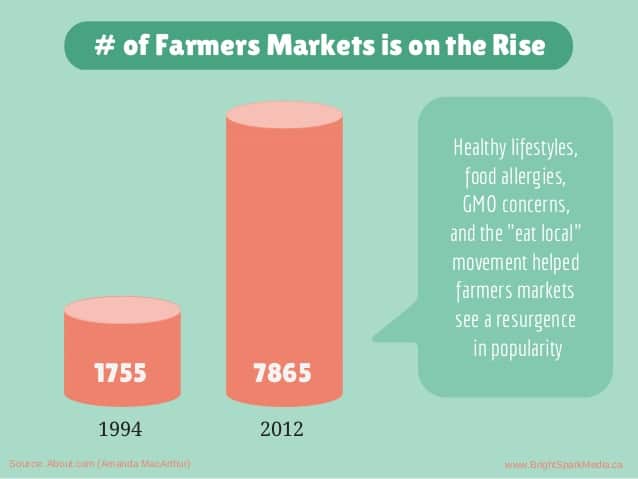In a survey conducted by USDA Outdoor Farmers Market, the following are the reasons why people go to shop at a local farmers market:
27% of the respondents gave freshness and taste as their main reason,
22% go there to support their local agriculture,
18% noted that it was convenient to shop at a farmers market,
15% enjoyed the community atmosphere,
11% liked the variety of local agriculture,
While 7% were keen on price.
And to be honest, these are the main reasons why local farmers markets have become so popular.
Consumers have learned that homegrown fruits, veggies, and other foods usually taste much better than what you’ll find in grocery store aisles, as they tend to be the freshest and most flavorful, as well as more nutritious.
That’s because the time between harvesting and serving is often less than 24 hours, resulting in more nutrient-rich produce compared to what’s on offer at the supermarket.
Savvy, ethical consumers know that it’s better for the local community and the environment too as the average distance that food travels to get to your dining table is 1,500 miles.
Shipping it uses up massive amounts of natural resources, especially fossil fuels. It also contributes to more trash in the landfill because of the packaging and adds to pollution.
I bet these are the reasons why you like going to shop at a farmers market.
How do I know?
Because the numbers speak for themselves, the image below shows how the number of farmers markets keeps growing not just in a single region but across the globe.

But all is not rosy though:
Are You Being Duped at Your Local Farmers Market?
There’s a good chance you are.
Despite the immense benefits of buying local, some people still hesitate, wondering how to know if the produce sold at farmers markets is truly organic, safely grown, and healthy.
You might be one of these people.
How should you know whether you are buying from genuine vendors?
That’s certainly a valid question, considering that most farmers markets around the world allow pretty much any vendor to set up in a given space – and, it’s true that while in most cases, they’re filled with clean, healthy, nutrient-dense food, not everything is necessarily represented honestly.
In this article, I’m going to demonstrate how you’re being duped and offer smart ways to avoid becoming a victim of such dishonesty.
Why the locally grown narrative shouldn’t be the only basis for your purchases
Let me repeat:
Don’t let a home-grown narrative send you on a purchasing spree without conducting any due diligence.
If local means produced within 100 miles, you should be aware of something that is going on in most countries. And it’s probably going on in yours too!
As more and more farmer’s markets are popping up worldwide, it is becoming easier for consumers to get duped by fake local food.
That’s right.
All the food sold in your farmer’s market may not be produced by regional farmers.
Some of it, in fact, may have been purchased through the same wholesale channels that grocery retailers use, or places where you could purchase foods as well, without the middleman at the farmer’s market.
To prove this, the Marketplace team under the Canadian Broadcasting Corporation (CBC) went undercover at 11 bustling markets across Ontario last summer to ask vendors where their produce came from and then tested the veracity of those claims using surveillance and other investigative techniques.
The results suggested many consumers could be paying premium prices for produce with fake backstories about where it was grown.
And they had the following video to prove the fraud that goes on at most farmers markets.
I’ll wait as you watch it:
Are you done?
Now, as you’ve seen, at four of the markets, the investigation exposed five different vendors who claimed to be selling fresh produce they had grown themselves but who were actually cashing in by reselling wholesale goods purchased elsewhere.
At a fifth market, the team discovered a vendor passing off Mexican produce as Ontario-grown.
Farmers Market Fraud Casualties
Let’s face this, you are not the only one who’s being hurt by reseller lies.
According to the same report, a 2016 study from the Greenbelt Farmers’ Market Network, an organization that connects more than 100 farmers markets in southern Ontario’s Greenbelt, found small-scale farmers, like Lauren Nurse, are growing increasingly reliant on markets as a source of income.
The study says nearly half of farmers surveyed rely on markets for 75 percent or more of their income, up from just a quarter of farmers five years earlier.
Nurse says she finds it very frustrating when resellers bring seasonal produce and undercut her on price.
In some countries, over 70% of the population are small-scale farmers who rely on selling directly to the local communities. That means if their sales drop … It really hits their bottom line.
How to Safeguard Yourself Against Being Duped
The best way to find out is to visit your local farmers market and talk to the local farmers and sellers about their particular practices.
It’s also important to learn what’s in season and be aware of what fruits and vegetables shouldn’t be available locally at a particular time of year.
Another dead giveaway is to be observant of discarded wholesale packaging behind a vendor’s stall.
But there’s even a better way.
And that’s the recently launched review site for farmers market called AgrimarketAdvisor.
AgrimarketAdvisor provides an independent platform for whistle-blowing through a review system that encourages users to rate their favorite farmers market.
On this site, you can submit your preferred farmers market for free, write a review about your shopping experience, and even submit photos.
This is an important way to ensure that ethical local markets are discovered and shady ones are ignored.
Other than that you need to conduct due diligence by asking the following questions;
1. Who grew the food, and where was it grown?
You can start by interrogating whether the vendor actually grows what he or she is selling. Most of them would be honest enough to be upfront.
It is vital that you understand where your food comes from. Understanding what the food you buy is and where it has come from is very important for your health as there are a lot of dangerous practices that can make even healthy food dangerous to eat.
Luckily enough, some farmers’ markets only allow growers only to sell at the market.
2. Is it organic?
Another way is to ask whether the food on display is organic.
In most cases, organic food should be accompanied by relevant certifications.
By European law, for example, organic food must meet strict rules, so you know that you are getting fresh, healthy food that is produced with natural fertilizers.
3. How long will it last?
According to statistics from the Farmers Market Coalition, more than 85% of vendors at your local farmers’ market have traveled less than 50 miles to sell their products and produce.
In comparison, produce found in chain supermarkets has often traveled on average more than 1,200 miles before reaching your local shelves.
Therefore, locally grown food should have a superior shelf life than those from resellers.
If you get a contrary answer from your vendor, then you should get worried.
4. What items will they have in the coming weeks?
It’s also important to ask the vendor what other items they’ll be offering in subsequent weeks.
This will help you understand a bit of the history and future plans of the vendor. In most cases, if they are really growing the food themselves, it shouldn’t be a difficult question for them to answer.
5. Can you visit their farm?
Make sure to ask if you can visit their farm to have a feel of the practices carried out. Transparent vendors will agree to this and some will even be excited about it.
Conclusion
You’ve just read about some of the lies being peddled around your local farmers market.
However, I have one disclaimer:
Not all local farmers market lies to their customers. Indeed some are doing a very good job of ensuring that consumers are getting value for money.
Most of those farmers markets are well managed and frequent inspections and auditing is carried out to safeguard the interest of the consumers.
But for the few unethical ones, their scheme has been exposed and now you know what to do next time.
Let me know your thoughts in the comments.



